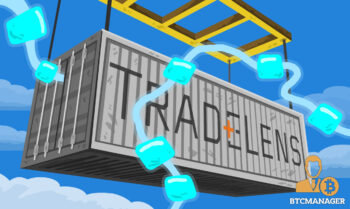
2018-8-12 23:00 |
On August 9, 2018, IBM and supply chain juggernaut Maersk have added 92 clients to their blockchain platform in a bid to revolutionize global shipping using blockchain technology.
Blockchain and LogisticsThe new venture created by the two global companies has been dubbed TradeLens. Through its early, the companies have been working on an interlocking system of blockchain backed ports to reduce reliance on intermediaries, and therefore, overhead. The beginning phases of the project have proven successful and resulted in 154 million shipping events globally. Currently, it is on pace to grow at a million a day.
Adding to the roster of TradeLens partners is Pacific International Lines and Hamburg Sud, both of which operate in the shipping industries. This project also includes cargo owners, customs authorities, and freight forwarders.
At the moment, shipping companies make up over 20 percent of the supply chain currently active around the world. Logistics is a global business and blockchain technology hopes to create a more efficient and interconnected world. TradeLens has the first mover advantage in this space and, therefore, stands to gain considerable profits if the project proves its utility.
The Beginning of the BlockchainThis platform is in its beta form as it is still on the search for early-adopter applications. It is also bringing smart contracts to its clients which will reduce the need for complex and inefficient shipping orders facilitated through intermediaries.
Adding blockchain technology to the global logistics business is a natural step to making believers out of skeptics. While many people and companies don’t understand the how blockchain protocols can affect their bottom line, this is a crucial step forward for the blockchain space.
With 150 million events captured by TradeLens, investors can see the utility of blockchain first hand.
Leapfrogging Legacy SystemsThe system works by giving individual users a blockchain node which allows them to send money without a bank. This is a potential boon for the shipping industry given that it is costly to send and receive money through international banks which often take a percentage of the funds being transferred.
The World Trade Organization previously suggested that a simplification of the global supply chain could bring costs down by as much as 17.5 percent. This would also allow developing nations greater access to the worldwide market by letting them leapfrog over existing and outmoded technologies.
According to this, customs offices in Australia, Saudi Arabia, Peru, and Singapore have signed on to the TradeLens platform. The Customs Administration of The Netherlands, which projects shipping 15 million containers this year, has also signed on. This gives TradeLens access to as much as a third of the shipping sector entering Europe. Blockchain technology is desirable for shipping and receiving as well as undercutting risks during customs procedures.
Pay-to-Play Open LedgerTradeLens monetizes its program by charging to enter the blockchain. Other blockchains like Ethereum and Bitcoin are “permissionless” meaning that anyone can access them. However, for a shipping company to obtain the efficiency of TradeLens, they will eventually have to pay to enjoy the service.
The intellectual property that forms TradeLens is co-owned by IBM and Maersk, while the two companies operate independently. Although other competitors will undoubtedly enter the market of an open-ledger supply chain, TradeLens is already capturing shipping data in real time with the hope that the tide of blockchain will raise all boats.
The post IBM and Maersk Eye Blockchain Logistics Market with TradeLens appeared first on BTCMANAGER.
origin »Bitcoin price in Telegram @btc_price_every_hour
High Performance Blockchain (HPB) на Currencies.ru
|
|





